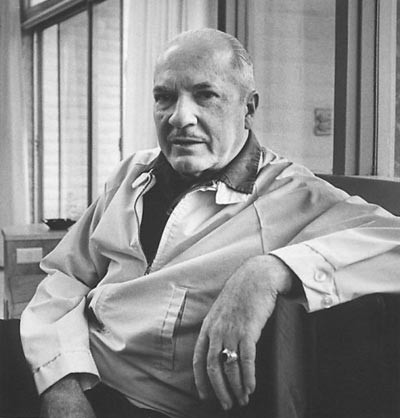jeudi, 19 mars 2009
Patriotic Anarch? 100 Years of Robert A. Heinlein
| |
THE first book I read that was authored by Robert A. Heinlein was “Stranger in a Strange Land”. I borrowed it from my younger brother and it was a cheap paperback edition with a very beautiful cover. I still keep it in my library at my family home in the Azores. “Stranger in a Strange Land” was considered very progressive in Heinlein’s day, dealing with the sexual revolution when that sort of thing was still considered as counter-culture and giving Heinlein himself some sort of guru status. Even though the book was first published in 1961, that edition was censored and the readers only got a chance to read the book in its entirety in 1991. Some claims have been made that this was the book that inspired the Manson Cult, even though Charles Manson himself publicly stated that he didn’t ever even read the book and had no responsibility regarding what his followers read.
Born July 7, 1907, Heinlein began his political trail as a regular left-winger but somehow along the trail that changed and when he died he was viewed as some sort of right-wing anarchist. I can’t really tell you what happened, but his “Starship Troopers” novel did sound a bit anti-communist to me and it was published earlier than “Stranger in a Strange Land”. But since anti-communism cannot be considered as something which is reviled by right-wingers alone, after all, regular anarchists are also anti-communist as part of their anti-authoritarian agenda (say what you like, proletariat dictatorship is still a dictatorship) and that goes as far back as the First International, when Mikhail Bakunin clashed with Karl Marx. So, many left-wingers (I would dare say most) are anti-communist and that’s nothing new.
I’ll avoid all the fuss about whether “Starship Troopers” was an ode to militarism or some sort of patriotic fascist order and place it, instead, side by side with “Nineteen Eighty-Four”, “The Iron Heel” and “Brave New World”. It depicts a future under an authoritarian form of government and that is that! Let me borrow a quote from Wikipedia: “The overall theme of the book is that social responsibility requires individual sacrifice. Heinlein's Terran Federation is a limited democracy with aspects of a meritocracy based on willingness to sacrifice in the common interest. Suffrage belongs only to those willing to serve their society by two years of volunteer Federal Service (there is no draft)” Well, that sounds good to me and remains one of my own views on Socialism. The common interest of the people should be more important than the interest of individuals and this would improve our modern society, even though I also believe that we need a more significant change.
Returning to Heinlein, as was common practice among militaristic science fiction writers, once upon a time he had been a soldier and served in the United States Navy during World War Two, but due to health reasons he never had a chance to fight. He remained in the States, in the background, during the war. He and his wife, during the Cold War, founded the Patrick Henry League when the National Committee for a Sane Nuclear Policy, in 1958, tried to unilaterally stop all nuclear weapons testing in the USA despite the fact that the Soviet Union could keep on testing theirs… which sounds like the act of a patriot. To this day “Starship Troopers” remains a part of the reading list in four of the five existing American military academies (covering the Army, the Marines and the Navy).
So, what was he? He has been labeled a fascist, a nazi, a racist and at the same time promoted homophobia and sexual liberation. And if in “Starship Troopers” we see him picturing good government as big government, on the other hand we find him fighting central government in “The Moon is a Harsh Mistress” while promoting small communities as models of individual freedom (as any good anarchist should). and what can one say about his “Take Back Your Government!: A Practical Handbook for the Private Citizen Who Wants Democracy to Work”?
All of his earlier writings and even his Socialist political activism will show him as an anarchist, but due to the peculiarities of the Cold War he also embraced patriotism. His country was at war with a federation of foreign countries and it seemed natural to him to stand up for his fellow countrymen, but let us not forget that his position regarding homosexuality, sexual liberation, his criticism of organised religion and his more private issues (he remained a naturist all of his life) can hardly be interpreted as right-wing. His writing was revolutionary, his positions were those of a traditional anarchist, but when need be he also was a patriot and criticised Soviet Communism, which should not be mistaken with Socialism.
His books remain as exciting today as they were almost half a century ago and important lessons can be derived from all of them, as well as great entertainment. He did won four Hugo awards, after all, so let us hope that this revolutionary writer and thinker will not be forgotten so soon.
| Ho | Articl | Essay | Interview | Poetr | Miscellan | Review | Book | Archive | Link |
00:20 Publié dans Littérature | Lien permanent | Commentaires (0) | Tags : littérature, lettres, lettres américaines, littérature américaine, science fiction, etats-unis |  |
|  del.icio.us |
del.icio.us |  |
|  Digg |
Digg | ![]() Facebook
Facebook




Les commentaires sont fermés.